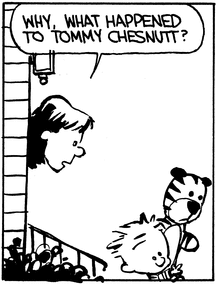What Happened to Tommy Chesnutt?
I don't expect our first entry in this series to be entirely indicative of the types of situations we will be investigating in these strips, as it hinges on a past event that Calvin describes but that we don't actually witness. We don't get a lot of this sort of thing (perhaps some early-installment weirdness at play), but I certainly think this instance gives us plenty to talk about.
This strip centers around a conversation Calvin has with his mother as he is departing for school. Seeing that her son is bringing his stuffed animal with him to class again and showing concern for his attachment to the toy, Mom asks if any of his classmates bully him about it. Calvin tells her that "Tommy Chesnutt did once, and now nobody does." When Mom then asks him what happened to Tommy Chesnutt, Calvin replies that "Hobbes ate him!" In the final panel, Hobbes has an ill expression and comments that Tommy had needed a bath, implying that he was unpleasant to consume. Thus, the question we're examining today is: did Hobbes actually eat a child?

It's difficult to imagine that the answer is anything other than "certainly not", if only to avoid the dark undertones such an outcome would imply. However, we can also discount the question for the simple reason that the Tommy Chesnutt incident would have been the talk of the town—and if Calvin's stuffed tiger ate a kid, this probably wouldn't be the first that his parents are hearing about it. This tracks with what we know about how others see Hobbes; given how he is perceived to be an inanimate stuffed animal by the general populace, it's unlikely that any other students would have actually seen Tommy be devoured by a tiger before their eyes (thank goodness).
This means that if Calvin's version of events is true, Tommy must have been eaten when nobody else was watching. Even so, Tommy's disappearance would have launched a missing person investigation that easily had the potential to be the headline story of the local news for days on end. A child gets sent to school and vanishes halfway through the day? There is hardly a chance that the name "Tommy Chesnutt" wouldn't have been burned into the minds of every parent in the area, much less those of the parents whose own children had went to class with the kid. Given that Calvin is only old enough to have attended kindergarten and 1st grade, these events must have happened within the last two years, and quite possibly could even have occurred much more recently than that, so it's not likely that the investigation would have dropped from memory.
Yet, in panel three, Mom's expression is one of mild curiosity as she wonders, "Why? What happened to Tommy Chesnutt?" If she's asking Calvin to expound on a mystery that has remained unsolved for months, she's not acting like it's any sort of big deal. On one hand, it could be argued that Mom is all too familiar with her child's propensity to tell tall tales and isn't going to excite herself over what answers might be forthcoming. On the other hand, there's no indication that "Tommy Chesnutt" is even a name she recognizes; this could be a classmate that Calvin has never mentioned, or has wholesale invented. With no evidence to lead us one way or the other, we have to invoke Occam's Razor and suggest that the simpler of the two theories is the more likely one. Tommy Chesnutt is not a missing person, which means that he was not eaten by Hobbes. Big surprise, Calvin is not being truthful here.
My own interpretation is that Tommy Chesnutt was a classmate who did harass Calvin to some extent, but who has since moved away. "Hobbes ate him" is Calvin's explanation for Tommy's disappearance—a very appealing delusion to fall into for a bullied child with a ferocious jungle cat as a companion. I'm sure that, in truth, the other students are ignoring Calvin more than they're making fun of him, and likewise aren't the least bit intimidated by Hobbes. On the other hand, Calvin's belief does make for a more surprising and amusing punchline; so if you want to think that's what happened to your antagonist? You've earned it, kid.
Verdict: Unless we need to re-contextualize the entirety of Calvin & Hobbes around the unresolved disappearance of a local 6-year-old boy, I think we can blame Calvin's imagination for this one.